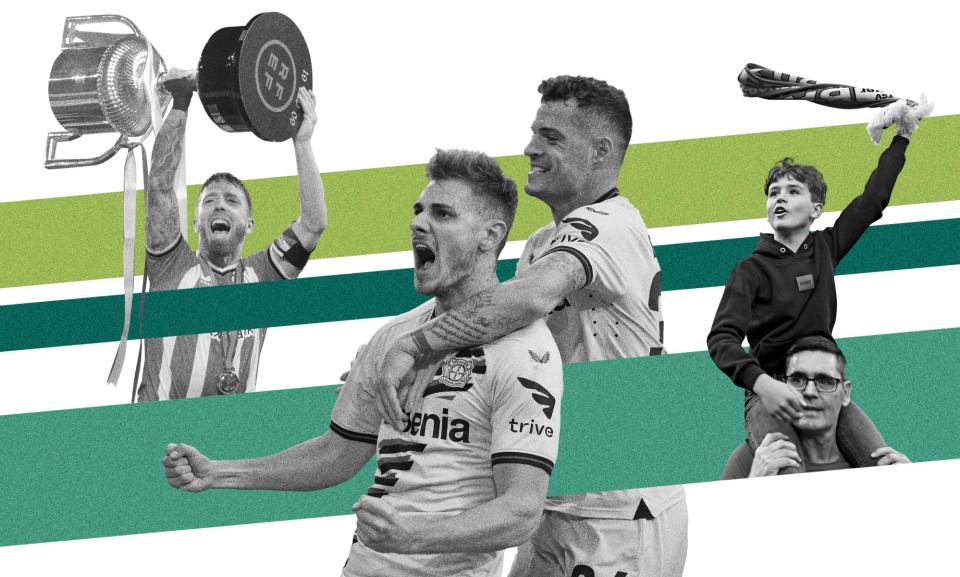Bayer Leverkusen’s success is a reminder of soccer’s community power

A corner from the left, seven minutes into injury-time. The Croatian defender Josip Stanišić rises at the near post. His header is too firm to be described as glancing, but it is well directed and flashes across goal and in for an equaliser. The black and red corner of the Signal Iduna Park erupts. Several minutes after the game they were still celebrating with their players. The Bundesliga title is already won but there should be no doubt that Bayer Leverkusen care about their unbeaten record.
Until that moment, there had been a sense of anticlimax about Borussia Dortmund against Leverkusen. What had, a month or so ago, looked like potentially being the game at which Xabi Alonso’s side would wrap up the title instead became, thanks to Bayern Munich squandering a two-goal lead against Heidenheim two weeks ago, the first game on their five-game victory lap. Dortmund, similarly, were on a comedown after Wednesday’s Champions League quarter-final win over Atlético. Fifth place is all but secure and, with Germany looking very likely to have five Champions League slots next season, it doesn’t much matter whether they catch RB Leipzig, who are two points clear in fourth.
The game, in truth, had been patchy, a little bad-tempered; there was a clear sense of players, if not going through the motions, then at least being aware that the league is no longer the priority. But then Niclas Füllkrug put Dortmund ahead with nine minutes to go and Leverkusen found themselves with something to fight for. No side has ever passed unbeaten through an entire Bundesliga season before; they are also unbeaten in the DFB Pokal, in the final of which they will face second-flight Kaiserslautern, and the Europa League, where Roma await in the semi-final. On came Patrik Schick and Victor Boniface, the tempo changed, some sort of muscle memory kicked in and suddenly there was a glimpse of why Leverkusen have had the success they have had this season. For the 20th time this season, they scored a goal after the 85th minute of a game and their unblemished run was extended.
For Leverkusen, this is a dream season. Five times they have finished as runner-up in the Bundesliga. In 2001-02 they achieved the silver treble of coming second in the league and losing in both the Pokal and Champions League finals. But the Neverkusen nickname just makes what is happening this season all the sweeter. Given their backing from the pharmaceutical giant Bayer, which clearly helped during the Covid shutdown, this isn’t perhaps quite the fairy story some would portray it as. But there is still something stirring about watching a club win something for the first time after 120 years of history. It is absolutely not the routine Bundesliga success that has become the norm for Bayern Munich.
The juxtaposition of Bayer’s success and Athletic Club winning the Copa del Rey for the first time in 40 years, the riverbanks in Bilbao one long mass of red and white as they made their traditional victory procession by barge, felt telling. This is what soccer still has the power to do. It can bring a sense of collective joy to provincial cities, confirm a community in its identity. You don’t have to have any affiliation to either city to feel moved by the scenes.
And then you consider the reality of modern soccer. There are protests against ticket prices at the majority of Premier League clubs. There is a growing perception that clubs care less about traditional fans, those who have been buying their season tickets and turning up week-in, week-out for years, for whom the club is an integral part of their identity, a birthright handed down through the generations, than for tourist fans for whom a game is a once a season, perhaps once a lifetime treat; the sort of fan who is prepared to pay an exorbitant price for a ticket and then compounds their value with a spree in the club shop.
The Premier League, despite recent results in Europe, is the most popular league in the world. Part of its success is the interest it draws from overseas and, given how it’s built of foreign players, owners and coaches, it would be absurd to reject foreign fans.
But at the same time, it feels like soccer is moving into dangerous territory. One of the great strengths of European soccer is that the clubs are organic entities, that they are not empty franchises. They have a value and a meaning that is rooted in the local community; they are not just businesses. Balancing that with the globalised context is hugely difficult; a constant lust for growth and obsession with the bottom line probably isn’t the best way to do that.
It’s naive, of course, to think that most modern owners care for anything other than profit. But equally, it’s impossible to look at the success of Leverkusen and the joy it has brought an unremarkable mid-sized town on the Rhine and not think that this is what soccer should really be about.
This is an extract from Soccer with Jonathan Wilson, a weekly look from the Guardian US at the game in Europe and beyond. Subscribe for free here. Have a question for Jonathan? Email soccerwithjw@theguardian.com, and he’ll answer the best in a future edition

